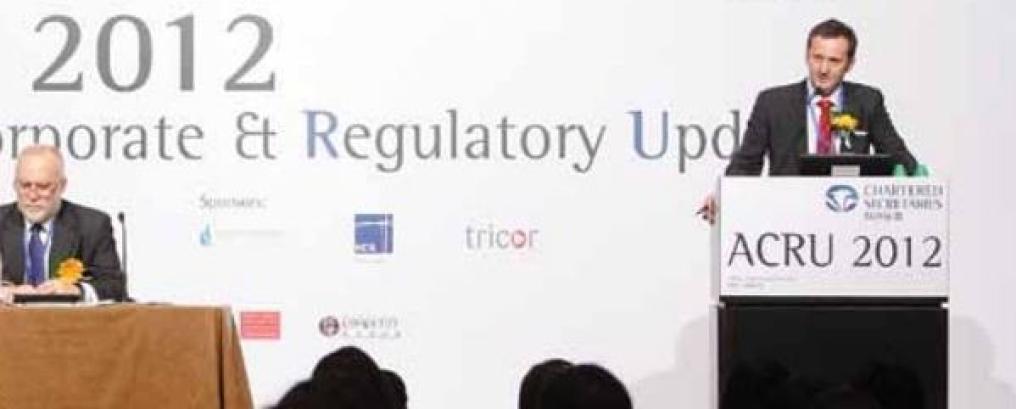
The rule is... think for yourself. A new approach to compliance
Saturday | 7 July 2012
One of the central themes of this year's Annual Corporate and Regulatory Update seminar was that compliance, particularly in a principles-based regulatory regime, cannot be a box ticking exercise – companies, and the company secretaries advising them, need to think independently about the corporate governance issues relevant to them
I n theory it sounds fairly straightforward – here is the rule, this is what you have to do. As any company secretary knows, however, compliance is never really that simple. Effective compliance, particularly in a principles-based regime, requires companies to think independently about the issues confronting them. Directors, and the company secretaries advising them, need to know a lot more than the rules governing, say, connected transactions or director independence – they need to be able to make a considered judgement based on their own particular circumstances. This emerged as one of the central themes of this years’ Annual Corporate and Regulatory Update (ACRU) seminar, held on 23 May at the Convention and Exhibition Centre. In particular, speakers from Hong Kong Exchanges and Clearing Ltd (HKEx) and the Securities and Futures Commission (SFC) urged the benefits of thinking for yourself.Addicted to rules?
The introduction of the 'comply or explain’ principle as the enforcement mechanism for Hong Kong's Corporate Governance Code was supposed to enable companies to forge their own approaches to corporate governance issues based on their own individual circumstances. This principle allows for some flexibility in the application of the rules set out in the code – where individual rules don’t fit the particular organisational setting, companies are expected to deviate. It has not quite worked out that way. There has been a very high degree of compliance with the code and this enthusiasm for complying with the code's recommendations and provisions is no bad thing of course, but what conclusions should we draw from the fact that so few companies have opted for the 'explain’ option? Why are companies in Hong Kong so reluctant to forge their own solutions to the corporate governance challenges addressed by the code? Michael Cheng, Senior Vice-President, HKEx, believes that many companies in Hong Kong still approach code compliance with a rules-based frame of mind. 'Under a principles-based regime you are encouraged to think about corporate governance – it is not a boxticking exercise,’ he said. He added that one reason for companies’ reluctance to follow alternative routes to compliance is the assumption that any deviation from the recommendations of the code would be regarded with suspicion by the market. Again, this is not really how the comply or explain principle is supposed to work. Ideally investors make an informed assessment of any deviations. If non-compliance is justified in the particular circumstances and the deviation from the code is adequately explained, investors would continue to have faith in the stock. If the deviation is due to a failure of governance and the explanation is spurious, then investors would sell. Since directors are interested in delivering shareholder value through higher share prices, comply or explain is therefore supposed to be the perfect 'market based’ enforcement mechanism of good corporate governance. Mr Cheng emphasised that deviations from the code should not be regarded per se as 'deviant’ governance. 'I often have people saying to me, “Michael I want to comply I don’t want to explain”, but in certain circumstances alternative corporate governance arrangements are acceptable, even desirable, and shareholders should not regard these alternatives as suspect,’ he said. Another misunderstanding Mr Cheng was keen to address is the notion that any deviation from code provisions would be a breach of the listing rules. The Exchange included in its consultation conclusions on the recent revisions to the code, an explanation of the three different levels of compliance requirements in the rules and the code:- Listing rules – mandatory for all listed companies and breaches may lead to sanctions
- Code provisions – companies can either adopt the code provisions, or, if they decide not to adopt them, explain the reasons for this decision in their Corporate Governance Report.
- Recommended best practices – listed companies are encouraged to comply, but if they do not, they do not need to explain why.
Call a lawyer or make a judgement call?
From the foregoing, you might imagine that the work of compliance professionals, including company secretaries, would be easier in a rules-based regime. The fact is of course that, whatever a jurisdiction's regulatory philosophy, it is impossible to stipulate precise rules for everything. Indeed, as Charles Grieve, Senior Director of Corporate Finance, SFC, pointed out in his ACRU presentation, there are limits on how precise you can be when drafting rules on complex matters of corporate regulation. Mr Grieve's presentation discussed the requirements for the disclosure of pricesensitive information (PSI) in the revised Securities and Futures Ordinance (SFO), which will commence operation on 1 January 2013, and a recurrent theme was the need to think through the implications of the requirements for your own specific circumstances. 'It is going to be a judgement call,’ he said. 'It needs to be thought about’. For example, there have been many concerns in the market about the definition of 'inside information’. Mr Grieve looked at each of the three key elements of inside information to demonstrate how its meaning will always depend on specific circumstances.- The information must be 'specific’. Mr Grieve warned that 'specific’ here does not necessarily mean 'precise' information. 'Thus if your information amounts to “we've lost a lot of money but we don’t know yet how much”, we regard that as specific information,’ he said.
- The information 'must not be generally known’ to that segment of the market which deals, or would likely deal, in the corporation's securities. You might expect that readily observable matters such as changes in commodity prices, or foreign exchange and interest rates, would be regarded as information generally known. Mr Grieve pointed out, however, that only the company knows how much these factors will affect the company. Thus, if a companies’ financial hedging strategy means that a change in foreign exchange rates has resulted in substantial losses, the company needs to tell the market.
- The information would, if so known, 'be likely to materially affect the price of the corporation's securities’. 'Everyone has asked about this,’ said Mr Grieve. There have been calls from the market and even the Legislative Council for the SFC to issue percentages to determine how significant the price change would need to be to trigger the PSI disclosure obligation. 'It has got to change the price to a significant degree, but we cannot give percentages,’ he said.
- changes in performance or the expectation of the performance
- changes in financial position, for example cashflow crisis, credit crunch
- takeovers and mergers
- acquisitions or disposals
- share placing, rights issue, other share issues
- changes in value of assets or financial instruments
- petitions or winding up orders
- legal disputes and proceedings, and
- cancellation of credit lines.


